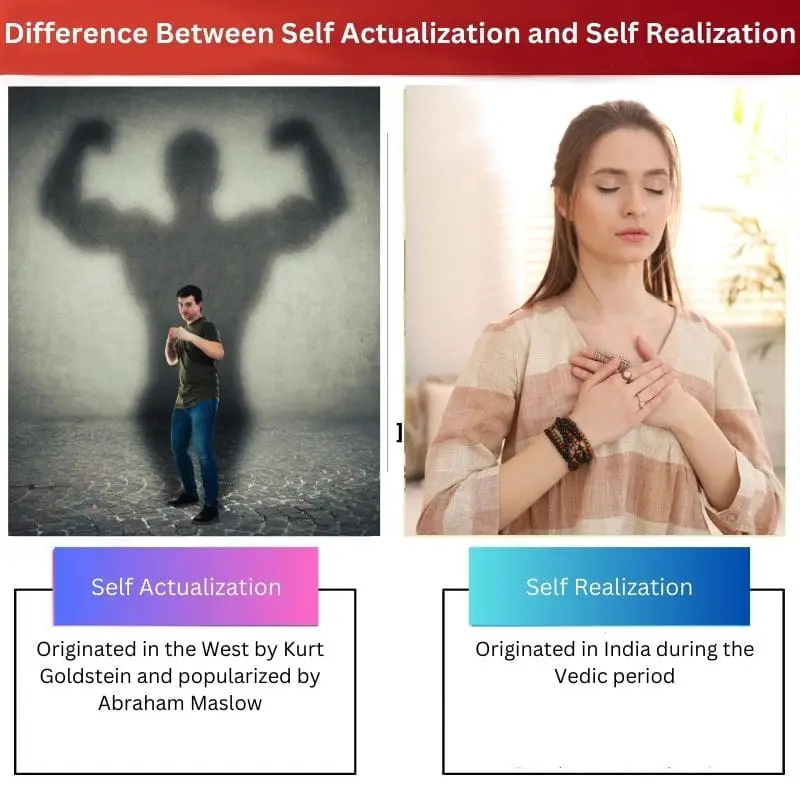The term ‘psychology’ refers to the scientific discipline of studying various psychological states, behaviour, and processes in humans and various animals.
It is of two types: psychology as a profession practised by a variety of people all over the world and a gradually growing science dealing with social behaviour, mind and brain.
Key Takeaways
- Self-actualization is one’s full potential, while self-realization is realizing one’s true self or identity.
- Self-actualization focuses on achieving goals and personal growth, while self-realization focuses on understanding oneself and finding meaning in life.
- Self-actualization is a higher level of development according to Maslow’s hierarchy of needs, while self-realization is a spiritual concept in Hinduism and Buddhism.
Self Actualization and Self Realization
Self-actualization refers to the process of realizing one’s full potential and achieving personal fulfilment and is a key component of Abraham Maslow’s hierarchy of needs. Self-realization refers to the process of gaining a deep understanding of one’s true nature, identity, and purpose in life.

Self-actualization is concerned with fulfilling the soul’s true potential. It is the process in which a person has realised his true potential and expresses his desire to help others and grow towards fulfilling goals beyond basic survival needs.
The ego becomes selfless in the process, and one uses his potential for the greater good of society.
Self-realization is the process of discovering our true worth beyond the ego’s usual habits and patterns. The individual lets go of his emotional attachments with the world and frees himself of his old unfruitful cycles.
It involves developing clear perception and equanimity. It holds different connotations and importance in a variety of religions.
Comparison Table
| Parameters of Comparison | Self Actualization | Self Realization |
|---|---|---|
| Definition | Full realization of one’s true potential | Fulfilling the possibilities of one’s personality or character |
| Origin | Originated in the West by Kurt Goldstein and popularized by Abraham Maslow | Originated in India during the Vedic period |
| Kind of concept | Psychological | Spiritual |
| Relation of self with the world | Self relates only to the outside physical world | Self relates to the inner metaphysical world |
| A person’s behaviour | CreativeDeep interpersonal relationships | Peace of selfStrong fulfillment of spirit |
| Self and its parts | Includes only consciousness and identity | Includes unconsciousness |
| Common usage | In humanistic psychology; outside spiritual context | Psychodynamic personality perspective; used in spiritual context |
What is Self Actualization?
Self-actualization is a Western psychological concept that was first introduced by Kurt Goldstein, but Abraham Maslow explained the full concept.
He brought to light the need for hierarchy, following which a person can achieve his soul’s true potential. In the article on ‘A Theory of Human Motivation’, self-actualization is defined by him as ‘the desire for self-fulfilment.
Malow popularized it through his Hierarchy of Needs, which puts survival needs at the bottom, above which there are growth needs, like fulfilment of creativity and potential. In this hierarchy, Maslow associates self-actualization with:
- Fulfilling of mission which may be called destiny, fate or vocation
- The ongoing process of fulfilment of potentials, talents and capacities
- A fuller understanding of oneself
- A never-ending cycle of unity, synergy or integration within the person
According to him, it is not a goal but a process for which a person has to go through various levels. After fulfilling the lower ladder, one can climb up and achieve the same.
The ladders comprise physiological needs, followed by safety factors, and then the fulfilment of social and esteem needs in order to become self-actualized. The person has the desire to grow bigger and continuously climb up the ladder to achieve the same.

What is Self Realization?
The concept of self-realization evolved in India during the Vedic period. The Upanishads talk about self-realization in detail. Its gist, relevance and importance are mentioned there.
It is broadly used in various religions where it is associated with divinity and holds the same value as awakening, enlightenment, illumination and various others. The person having self-realization feels spiritual fulfilment and has inner peace.
As an Eastern concept, rishis, men and women have achieved self-realization and are successful in separating their physical selves from their soul (Atman) and combining their atman with Brahman (the ultimate reality).
Self-realized people have all the answers concerning who they are and look beyond the traditional concept of life and death.
A combination of Atman with Brahman is known as Atman Jnana, wherein the person is fully self-aware and thinks beyond worldly needs. He is humble, not dream-oriented and unconditional.
In terms of a Western concept, it is used in psychodynamic perspectives of personality. In this, some of the mystical aspects of self-realization have been replaced. In western culture, individuation is used synonymously with self-realization.

Main Differences Between Self-Actualization and Self Realization
- Self-actualization is a Western concept explained in entirety by Maslow, whereas self-realization is an Eastern concept that originated in India during the Vedic period.
- Self-actualization refers to achieving one’s true potential, whereas self-realization is the fulfilment of the various possibilities of one’s personality.
- Self-actualization was adapted into humanistic psychology by Abraham Maslow, and psychodynamic theorists like Carl Jung adopted self-realisation into Western culture.
- A person who has achieved self-actualization is creative and has deep interpersonal relationships, whereas, in the case of self-realization, a person has inner peace and experiences strong spiritual fulfilment.
- Self Actualization does not include the unconscious, whereas self-realization does.

- https://www.researchgate.net/profile/Subhash-Sharma-3/publication/242595990_FROM_SELF-ACTUALISATION_TO_SELF-REALISATION_BEYOND_THE_SELFISH-GENE_SYNDROME/links/577bf6bd08aec3b743366cc0/FROM-SELF-ACTUALISATION-TO-SELF-REALISATION-BEYOND-THE-SELFISH-GENE-SYNDROME.pdf
- https://philpapers.org/rec/PETSAS-13



